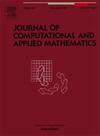在最大排序集抽样程序下,对来自广义倒置寿命分布族的依赖性互补竞争风险数据进行不等样分析
IF 2.1
2区 数学
Q1 MATHEMATICS, APPLIED
Journal of Computational and Applied Mathematics
Pub Date : 2024-10-11
DOI:10.1016/j.cam.2024.116309
引用次数: 0
摘要
本文探讨了当故障原因按所提出的广义倒置寿命分布族分布时,对依赖性互补竞争风险模型的分析。在不等样本的最大排序集抽样(MRSSU)下,分别用经典的频数法和贝叶斯法讨论了模型参数和可靠性指数的统计推断。研究获得了模型参数的最大似然估计值及其存在性和唯一性,并由此构建了相关的近似置信区间。研究还针对一般灵活先验进行了贝叶斯估计,并提出了用于复杂后验计算的马尔可夫链蒙特卡罗(MCMC)算法。在 MRSSU 情景中,当有额外的历史信息时,研究进一步检验了带有参数阶次限制的经典估计和贝叶斯估计。最后,通过数值模拟对不同结果的性能进行了评估,并提供了一个真实数据示例来演示我们方法的应用。本文章由计算机程序翻译,如有差异,请以英文原文为准。
Analysis of dependent complementary competing risks data from a generalized inverted family of lifetime distributions under a maximum ranked set sampling procedure with unequal samples
This paper explores analysis of a dependent complementary competing risks model when the failure causes are distributed by the proposed generalized inverted family of lifetime distributions. Under maximum ranked set sampling with unequal samples (MRSSU), statistical inference of model parameters and reliability indices is discussed under classical frequentist and Bayesian approaches, respectively. Maximum likelihood estimators along with their existence and uniqueness are obtained for model parameters, and associated approximate confidence intervals are constructed in consequence. Bayesian estimation is also performed with respect to general flexible priors, and the Markov Chain Monte Carlo (MCMC) algorithm is proposed for complex posterior computation. The study further examines classical and Bayesian estimations with order restriction of parameters when additional historical information is available in the MRSSU scenario. Finally, the performance of different results is evaluated through numerical simulations and a real data example is presented for demonstrating the application of our methods.
求助全文
通过发布文献求助,成功后即可免费获取论文全文。
去求助
来源期刊
CiteScore
5.40
自引率
4.20%
发文量
437
审稿时长
3.0 months
期刊介绍:
The Journal of Computational and Applied Mathematics publishes original papers of high scientific value in all areas of computational and applied mathematics. The main interest of the Journal is in papers that describe and analyze new computational techniques for solving scientific or engineering problems. Also the improved analysis, including the effectiveness and applicability, of existing methods and algorithms is of importance. The computational efficiency (e.g. the convergence, stability, accuracy, ...) should be proved and illustrated by nontrivial numerical examples. Papers describing only variants of existing methods, without adding significant new computational properties are not of interest.
The audience consists of: applied mathematicians, numerical analysts, computational scientists and engineers.

 求助内容:
求助内容: 应助结果提醒方式:
应助结果提醒方式:


